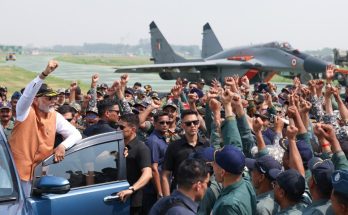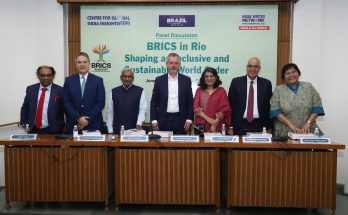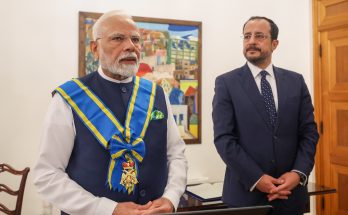
As the US, the world’s most powerful country holds elections, the world’s attention is fixed on the potential ramifications, particularly for India, which has emerged as the world’s fastest-growing major economy and a preeminent partner of Washington. In this wide-ranging conversation, Mr. Manish Chand, Founder- CEO, Centre for Global India Insights and India Writes Network and, speaks to Dr. Aparna Pande, Research Fellow at the Hudson Institute, Washington, and an expert in South Asia, on the potential impact of the 2024 US elections for India, the India-US relations, and the world.
“As long as China remains the main peer competitor of the United States, and as long as India continues to grow economically, and carve its space in Asia and Indo-Pacific, and stick to its democratic principles, the India-US relationship will continue down the path that it has up till now,” says Dr Pande.
WATCH THE VIDEO: https://www.youtube.com/watch?v=svLAuy4U1pY&t=20s
(Excerpts from the interview)

Q) How do you look at the prospects of a Trump presidency? What does the Trump 2.0 presidency mean for India’s core interests, especially at a time when India is carving its own place and voice in the international arena?
A) The race is still neck-to-neck and we will have to wait till November. It’s going to be a closely fought election like that of 2020.
India has an advantage – as they say, India is in a geopolitical sweet spot. India is one of those few countries where there’s bipartisan consensus among policymakers – whether Democrats and Republicans- about strong relations with India. Every president going back to President Clinton has visited India, including President Trump. Under President Trump, the Indo-Pacific strategy was started and QUAD restarted. The India-U.S. relationship is strategic and multifaceted and will remain strong irrespective of who wins the elections in 2024
There will, however, always be some tensions and some frictions, and there will be differences between the Biden and the Trump presidencies. However, as long as China remains the main peer competitor of the United States, and as long as India continues to grow economically, and carve its space in Asia and Indo-Pacific, and stick to its democratic principles, the India-US relationship will continue down the path that it has up till now.
Trade and Investment
Q) India and the US are close to $190 billion in bilateral trade, still way below the target of $500 billion. Some people in India have a Trump anxiety that Trump’s America will be more protectionist. How do you look at these concerns and anxieties relating to Trump’s trade policies?

A) Some of these concerns are justified, but India has advantages and can always work around them. The US has turned more protectionist since the Trump presidency and it continues at some level, even under the Biden presidency. India has always been protectionist as well. These are therefore two countries that are increasingly protectionist and have to find ways to deal with each other. Despite this bilateral trade has increased, under both Trump and the Biden presidencies. The difference, however, under a Trump 2.0 would most likely be in the area of negotiations. It is easier to negotiate when both sides are willing for a win-win, it is tougher when one side insists on win-lose or zero-sum, which often happened under the Trump presidency. The Harley Davidson issue was an example and so was the decision under the Trump presidency to remove India’s GSP Plus status. At the same time, the desire to deliver something tangible on the trade front may result in a symbolic deal or concessions.
What would be interesting to see would be the perspective of Trump 2.0 on the issue of sharing the crown jewels of American technology both in civilian and defence space with India without a tangible or perceived quid pro quo. Over the last three decades, American Presidents have had the view that India’s economic rise is good for the United States irrespective of the path India takes. Trump 1.0 viewed relations as transactional, and this approach will continue Trump 2.0.
Q) With PM Modi pitching for “Make in India, Make for the World” and Trump’s “America First policy,” where do you see the convergence? Do you think this difference in vision will be a source of friction in a potential Trump administration?
A) Protectionism can be a potential friction point but there can also be a workaround. From the Trump presidency onwards, the US establishment’s view of China as a peer competition and rival has grown. Successive U.S. administrations have, therefore, incentivized American companies coming back home and manufacturing. However, if companies seek to diversify then there has been an American preference for what is called ‘friendshoring’ — that they invest in countries that are American partners and allies like India, Vietnam, and other countries in Southeast Asia like Japan, South Korea, or Taiwan. So, for strategic reasons, companies investing in India or moving to India may be acceptable.
It was under the Trump presidency that the US national security strategy placed so much emphasis on India. While this protectionism plays a role, the desire to push back against China and to ensure that China is not benefiting will create some opportunity for India, but we will have to wait and see. This will be Trump’s second presidency and by default the last presidency for Trump if he wins. This means that he wants to leave a legacy and we’ll have to see what he chooses to leave as his legacy.
China Conundrum
Q) There is a robust bipartisan consensus in favour of developing stronger and diverse relations with India and on deterring China. Do you see any prospect of a US-China rapprochement at all either under Biden or Trump in the next four years?

A) For a long time, policymakers in India used to fear the idea of a G2 i.e. the fear that the US and China may divide the world with China being responsible for Asia and the US the rest. The likelihood of that happening seems difficult right now. For Trump, it will be difficult because the majority of his base is anti-China and his rhetoric on trade and security is China-focused, though not Russia-focused. For the Biden administration, both Russia and China are threats and challenges to be dealt with for different reasons. China is the peer competitor in technology. The US wants to ensure that China does not get access to high-end chips, high-end technology, and high-end defence equipment. So, for both Biden and Trump, the China factor will remain more important.
Now, that does not mean that there is a desire for war or conflict. The US would like conversation with China to continue on the economic or defence fronts to avoid conflict. India too does not want a conflict with China or a global conflict. We don’t want a conflict between the US and China or between India and China.
So China will remain the peer competitor but there may be a desire to smooth out the rough edges and ensure there is no conflict. However, the peer competition and rivalry will continue for one basic reason. The US’ grand strategy dating back to the end of the Second World War has been predated on one principle that the US will not allow another competitor to rise on the global stage. First, it was the Soviet Union, now it is China. So, it is antithetical to American national security interests to have a competitor which can at some point upstage the United States.
Q) The China factor is driving this deepening India-US partnership to the next level. Do you agree with that assessment? There are concerns in strategic circles in India, what would happen if the US and China were to make up? Will India-US relationship edifice remain as strong as before?
A) Well, the same could be applied in reverse. There are many around the world who are asking the question – will India and China make up after India’s elections and if so, will India still seek a strong relationship with the United States? If India and China improve relations, will India still be a part of Quad and Indo-Pacific and I2U2 in Malabar? It is natural for such questions to be asked.
However, I believe that the India-US relationship at its core is not China-based. At its core, it is values-based and such a partnership always outlives an interest-based partnership. Interests can change. During the Cold War and the war on terrorism, Pakistan was important for American interests; today Pakistan is not as relevant.
The United States, however, has sought a relationship with India dating back to pre-partition during President Franklin D. Roosevelt’s administration which is over 77 years ago now. Throughout the Cold War, after the end of the Cold War, during the war on terror, and after the war on terror, the US-India relationship has grown and deepened because of the notion that these are two democracies which have similar visions of global architecture and want similar things. They may be in different geographies and have different threats and concerns but overall, they agree on what the global architecture should be. That is what binds both two countries.
It is not just China, but China does play a role. The reason that India is seen as the China plus one on the commercial and the defensive technology front does matter. It is helping India build its defence cooperation and its defence architecture. It’s helping India on the commercial front. It is also helping the United States. Interests matter and they are helping both countries. Can they change? Maybe in some years they will but right now, China remains the peer competitor for the United States and for India, China is sitting on traditional Indian territory. So, for both countries, China matters.
Contentious Issues
Q) On the issue of the alleged Indian hand in the attempted killing of Khalistani activist Gurpatwant Singh Pannun, US Ambassador Eric Garcetti recently remarked that the “red line has been crossed.” There’s a sense that these issues will not matter so much to Trump. What do you think?
A) First, there are two different parts to the Pannun issue. One is the concern about extremism within certain small segments of the Sikh diaspora around the world. My think tank, Hudson Institute, brought out a report in 2021 on the rise of Khalistani extremism in the United States. The report traced its origins going back decades. It traced the support from Pakistan, and the links between Pakistani intelligence, these extremists, and the Kashmiri groups. We had warned that if the US law and order and homeland security do not keep a check on these groups and individuals, it has the potential to cause a rift in US-India relations.
There are small segments of the Sikh diaspora who espouse Khalistan, some who espouse it in a peaceful manner but there are many who do not. The US law and order and national security establishment have to do a better job of acting against them, following them, and tracking them as they did in the 1990s. And they have not done that.
The second part is the murder-for-hire incident, not just what happened in Canada, but also the attempted killing of Pannun in Brooklyn. Now, that is of deep concern to the US establishment. And it doesn’t matter whether the President is Biden or Trump, for any American administration the lives of its citizens are of paramount concern and the US has often been willing to go to great lengths to save and extricate its citizens. So, it is unlikely that any US administration would ignore an attempt to kill its citizen on its soil.
India and the US has long disagreed on how to deal with Khalistani extremists, including Pannun. However, the current frictions have more to do with American concerns over why a friendly country tried to kill an American citizen on American soil. That is what is what Ambassador Garcetti was referring to.
Lasting Legacy
Q) Donald Trump and Joe Biden, if they win, that will be their second and last shot at the most powerful job in the world. What kind of legacy will Trump leave behind as opposed to someone as seasoned as such a veteran diplomat as Joe Biden? What would it mean for India?

A) For both, there is a domestic legacy but different domestic legacies. For Biden 2.0, it would be leaving a better America on the economic front, infrastructure, climate, women’s issues, and minority rights. For Biden and the Democrats, protecting American democracy and enshrined constitutional rights have been important in his first term and will remain critical in the second term as well. So, rebuilding America from the ground up.
 Biden 2.0 would also want to continue supporting Ukraine and Taiwan, with China and Russia as the main threats. He would bolster the Indo-Pacific strategy and the relationship with India. This could mean more economic investment, more technology sharing, and more cooperation in the defence and strategic realm. For President Biden, India remains important. It is a country he has always wanted to build a relationship with for strategic reasons.
Biden 2.0 would also want to continue supporting Ukraine and Taiwan, with China and Russia as the main threats. He would bolster the Indo-Pacific strategy and the relationship with India. This could mean more economic investment, more technology sharing, and more cooperation in the defence and strategic realm. For President Biden, India remains important. It is a country he has always wanted to build a relationship with for strategic reasons.
Trump 2.0’s domestic focus will primarily be immigration. There will also be more protectionism. We can also not rule out the likelihood of actions against those organisations or people who Trump believes were or are against him. On the foreign policy front, China will remain important. Support for NATO, for other countries, will be contingent on what those countries or those groupings are willing to do for the United States. Under Trump 2.0, it will most likely be a more isolationist and inward-looking America. Regarding India, aside from the trade and immigration fronts, things may continue as they have. We will have to wait and see if Trump is going to allow the professionals to run foreign policy and defense – and thus allow the deepening of civilian and military tech cooperation and collaboration – or not.
Author Profile
- India Writes Network (www.indiawrites.org) is an emerging think tank and a media-publishing company focused on international affairs & the India Story. Centre for Global India Insights is the research arm of India Writes Network. To subscribe to India and the World, write to editor@indiawrites.org. A venture of TGII Media Private Limited, a leading media, publishing and consultancy company, IWN has carved a niche for balanced and exhaustive reporting and analysis of international affairs. Eminent personalities, politicians, diplomats, authors, strategy gurus and news-makers have contributed to India Writes Network, as also “India and the World,” a magazine focused on global affairs.
Latest entries
 India and the WorldJune 26, 2025Operation Sindoor: India Sheds Restraint, Rediscovers Utility of Force
India and the WorldJune 26, 2025Operation Sindoor: India Sheds Restraint, Rediscovers Utility of Force India and the WorldJune 23, 2025BRICS summit in Rio to focus on Global South, local currency trade
India and the WorldJune 23, 2025BRICS summit in Rio to focus on Global South, local currency trade Africa InsightsJune 11, 2025New Opportunities in India-Japan Cooperation in Africa
Africa InsightsJune 11, 2025New Opportunities in India-Japan Cooperation in Africa India and the WorldMay 23, 2025Post-Operation Sindoor, India reminds Turkey, China of concerns and sensitivities
India and the WorldMay 23, 2025Post-Operation Sindoor, India reminds Turkey, China of concerns and sensitivities







